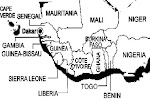>> Tuesday, 16 March 2010
 Why West Africa?
Why West Africa?This is a region that has had influences from all over the world. At some point– The French, The Germans, The Portuguese, The British, and The Netherlands all explored this vast region .
The countries making up West of Africa as a result all have strong similarities in the path bestowed upon them: colonisation, language, culture, food, art, clothing. A siginificant similarity is present in the case of The Fulani, the largest nomadic group in the World which are largely dispersed across West Africa. They can be found in countries such as Nigeria, Togo Mali, Niger, and Burkina Faso.
Trivia on some parts West Africa
The slave trade is one of the most poignant parts of the history of West Africa with Colonisation ringing across most of these countries. With influences from the French, English and Portuguese which led to an extraordinary partitions and changes within these countries.
Apart from a plethora of history and arts. It possesses a richness of culture: With the Asantes from Modern Ghana, to the Empire of Sokoto, to terracotta objects from Benin city to artefacts from Ife, West Africa is fortunate. (For more on Ife See the exhibition currently on show at the British Museum till the 6th of June)
The Republic of Benin, a French Colony was originally the Kingdom of Dahmoney. Benin had trading posts at Porto Novo and Cotonou where slaves were traded for weapons.
Ghana not to be confused with the Empire of Ghana (present day Mali) is believed to have some ancestoral links to the Empire. Modern day Ghana was to be colonised by Britain but the Portuguese again were the first to arrive.
The Gambia, the Oldest English Speaking Country in West Africa is beginning to thrive in upping its stake as tourist destination. The best selling book, “Roots” by American author Alex Haley used Gambia to showcase the slave trade from this area. Tours are now available allowing tourists to travel up the River Gambia to some of the landmarks.
Mali: The largest country is home to one of the oldest cities in West Africa Once a French Colony, Mali is also home to the ancient city of Timbuktu. Timbuktu became a centre point with traders from other parts of the world came to trade to goods such as books and gold.
Nigeria: with the largest population of any country in Africa it has the largest number of cultures and empires than any other African country, with its historic empires such as The Benin Empire, The Kingdom of Nri, The Northern Empire and the Oyo Empire.
Mauritania initially explored by the Portuguese, was one of the previous colonies that constituted French West Africa. With strong ties with its Northern Africa counterparts Hassaniya Arabic and French are the official languages spoken in Mauritania.
Sierra Leone; The Sierra Leone river is one of the places where Slaving ships from the trading European countries put in trade with the local rulers for their cargo of slaves. Again the Portuguese where the first to explore this land but it was soon to become a British colony but before this it’s capital Freetown already relinquished to the British was used as a home to the blacks in the armed forces and runaway slaves.
I will expand more on the bountiful history of these countries and others in posts to come. For the next post I will be blogging on Festivals across West Africa to further highlight the richness in culture and history.


0 comments:
Post a Comment